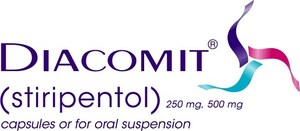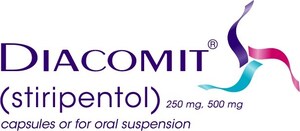SAN MATEO, Calif., Sept. 21, 2022 /PRNewswire/ -- Biocodex, Inc., a pharmaceutical company and manufacturer of DIACOMIT® (stiripentol), announced today that the U.S. Food and Drug Administration (FDA) has approved DIACOMIT for the treatment of seizures associated with Dravet syndrome in patients 6 months and older, weighing 15 lb or more, and taking clobazam.1 The antiseizure treatment first received FDA approval in 2018 for children 2 years and older.
DIACOMIT is now the only FDA-approved medication specifically indicated for Dravet syndrome seizures in children as young as 6 months. It is an effective treatment for seizures that are often resistant to other antiepileptic drugs. In two clinical studies, DIACOMIT reduced generalized clonic or tonic-clonic seizures by a median of 84% compared with 5.8% on placebo after two months.1,2 There are no clinical data to support the use of DIACOMIT as monotherapy in Dravet syndrome.1
"Biocodex is committed to supporting patients with Dravet syndrome and their caregivers," said Nicolas Coudurier, Biocodex's chief executive officer. "We are thrilled to positively impact more children's lives by providing access to specialized, effective treatment closer to the time of their Dravet syndrome diagnosis."
Dravet syndrome is a rare, lifelong disease that usually begins in the first year of life, when an otherwise normally developing child begins having frequent, prolonged seizures. These seizures can cause lasting damage, which over time can lead to cognitive and physical developmental delays.
DIACOMIT is a new molecular entity developed by Biocodex, Inc. DIACOMIT is approved for adjunctive treatment with clobazam in Dravet syndrome in 27 countries in the European Union (January 2007), Canada (December 2012), and Japan (September 2012). Biocodex received orphan drug designation for DIACOMIT from FDA in 2008 and full marketing authorization in 2018. The FDA approved its new indication in July 2022.
For more information, visit DIACOMIT.com.
DIACOMIT (stiripentol) is indicated for the treatment of seizures associated with Dravet syndrome (DS) in patients taking clobazam who are 6 months of age and older and weighing 7 kg or more. There are no clinical data to support the use of DIACOMIT as monotherapy in Dravet syndrome.
CONTRAINDICATIONS
No contraindications are listed.
WARNINGS & PRECAUTIONS
Somnolence
DIACOMIT can cause somnolence. Monitor patients for somnolence, particularly when DIACOMIT is used concomitantly with other CNS depressants or clobazam, which is also known to cause somnolence.
Decreased Appetite and Decreased Weight
DIACOMIT can cause decreases in appetite and weight. The growth and weight of pediatric patients treated with DIACOMIT should be carefully monitored.
Neutropenia and Thrombocytopenia
DIACOMIT can cause significant declines in neutrophil and platelet counts. Hematologic testing should be obtained prior to starting treatment with DIACOMIT and then every 6 months.
Withdrawal Symptoms
As with most antiepileptic drugs (AEDs), DIACOMIT should be gradually withdrawn to minimize the risk of increased seizure frequency and status epilepticus.
Risks in Patients with Phenylketonuria (PKU)
DIACOMIT for oral suspension contains phenylalanine, which can be harmful to patients with PKU. Before prescribing DIACOMIT for oral suspension to a patient with PKU, consider the total daily intake of phenylalanine from all sources, including DIACOMIT for oral suspension. DIACOMIT capsules do not contain phenylalanine.
Suicidal Behavior and Ideation
AEDs, including DIACOMIT, increase the risk of suicidal thoughts or behavior. Patients treated with any AED for any indication should be monitored for the emergence or worsening of depression, suicidal thoughts or behavior, and/or any unusual changes in mood or behavior.
ADVERSE REACTIONS
The most common adverse reactions that occurred in at least 10% of DIACOMIT-treated patients and more frequently than on placebo were somnolence, decreased appetite, agitation, ataxia, decreased weight, hypotonia, nausea, tremor, dysarthria, and insomnia.
PREGNANCY
There are no adequate data on the developmental risks associated with the use of DIACOMIT in pregnant women. Based on animal data, DIACOMIT may cause fetal harm.
There is a pregnancy exposure registry that monitors pregnancy outcomes in women exposed to AEDs, such as DIACOMIT, during pregnancy. Physicians are advised to recommend that pregnant patients taking DIACOMIT enroll in the North American Antiepileptic Drug (NAAED) Pregnancy Registry (information at www.aedpregnancyregistry.org). This can be done by calling the toll-free number 1-888-233-2334 and must be done by patients themselves or their caregiver. To report suspected adverse reactions, contact Biocodex at 1-866-330-3050 or FDA at 1-800-FDA-1088 or www.fda.gov/medwatch.
Please see full DIACOMIT Prescribing Information at http://www.DIACOMIT.com.
References: 1. DIACOMIT® [prescribing information]. Beauvais, France: Biocodex, Inc.; July 2022. 2. Food and Drug Administration. CDER Clinical Review. August 2018. https://www.accessdata.fda.gov/drugsatfda_docs/nda/2018/206709Orig1s000,207223Orig1s000MedR.pdf. Accessed May 12, 2020.
© 2022 Biocodex, Inc. All rights reserved. DIACOMIT® is a registered trademark of Biocodex, Inc. BBD-00156-082022
Biocodex, Inc. is a Silicon Valley-based pharmaceutical company dedicated to providing its customers with meaningful healthcare solutions. Biocodex, Inc. is the USA subsidiary of Biocodex, a leading provider of research on and understanding of human microbiota. The company is a family-owned, multinational pharmaceutical, research, development, manufacturing, and commercial enterprise operating in more than 100 countries. Visit www.biocodex.us/en/ for more information.
SOURCE Biocodex, Inc.

WANT YOUR COMPANY'S NEWS FEATURED ON PRNEWSWIRE.COM?
Newsrooms &
Influencers
Digital Media
Outlets
Journalists
Opted In






Share this article